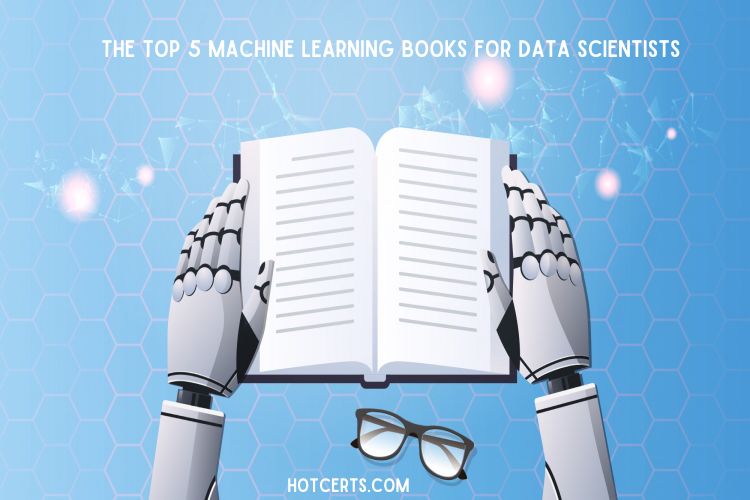The Top 5 Machine Learning Books for Data Scientists
Machine learning is an ever-evolving field with a vast array
of applications, including image and speech recognition, natural language
processing, and predictive analytics. Data scientists, who are at the forefront
of this technological revolution, need to stay up-to-date with the latest
advancements in machine learning. This can be accomplished by reading the rightbooks. In this article, we present the top 5 machine learning books that every
data scientist should have in their library.
1. Pattern
Recognition and Machine Learning by Christopher Bishop
Pattern Recognition and Machine Learning is considered a
classic in the field of machine learning. This book provides a comprehensive
overview of machine learning techniques and algorithms, including linear
regression, logistic regression, decision trees, support vector machines, and
neural networks. The author, Christopher Bishop, is a renowned machine learning
expert and a former Microsoft researcher. The book is written in an available and
straightforward style, making it ideal for both beginners and experienced data
scientists.
2. Machine Learning:
A Probabilistic Perspective by Kevin P. Murphy
Machine Learning: A Probabilistic Perspective is another
highly recommended book for data scientists. This book focuses on the
probabilistic foundations of machine learning and covers a wide range of
topics, including Bayesian networks, hidden Markov models, Gaussian processes,
and deep learning. The author, Kevin P. Murphy, is a well-respected machine
learning researcher and a professor at the University of California, Los
Angeles. This book is suitable for both researchers and practitioners who are
interested in gaining a deeper comprehension of the numerical underpinnings of
AI.
3. Data Science from
Scratch: First Principles with Python by Joel Grus
Data Science from Scratch is a unique book that takes a
hands-on approach to teaching data science. The author, Joel Grus, covers a
wide range of topics, including statistics, probability, linear algebra, and
machine learning. Throughout the book, the author uses Python code to
illustrate various concepts, making it ideal for data scientists who are
looking to learn the programming aspect of data science. The book is written in
a conversational style, making it easy to follow, even for those with limited
programming experience.
4. An Introduction to
Statistical Learning by Gareth James, Daniela Witten, Trevor Hastie, and Robert
Tibshirani
A Prologue to Measurable Learning is one more fundamental
book for information researchers.. This book provides a comprehensive overview
of statistical learning methods and is written by a team of leading machine
learning researchers. The book covers many subjects, including linear and
non-linear regression, tree-based methods, and regularization. The authors use
a clear and concise style, making the book suitable for both beginners and
experienced data scientists.
5. Deep Learning by
Ian Goodfellow, Yoshua Bengio, and Aaron Courville
Deep Learning is a comprehensive guide to deep learning, a
subfield of machine learning that is concerned with the development of
artificial neural networks. The book covers a wide range of topics, including
convolutional neural networks, recurrent neural networks, and generative
adversarial networks. The authors, Ian Goodfellow, Yoshua Bengio, and Aaron
Courville, are leading experts in the field of deep learning, and the book
provides a comprehensive overview of the latest advancements in deep learning
research.
In conclusion, these 5 books are a must-have for any datascientist who wants to keep awake to-date with the most recent progressions in
AI. Whether you're a beginner or an experienced data scientist, these books
will provide you with a comprehensive overview of the field and help you
develop your skills.
FAQs
Q1: What is the main
focus of "Pattern Recognition and Machine Learning"?
A1: "Pattern
Recognition and Machine Learning" focuses on providing a comprehensive
overview of machine learning techniques and algorithms, including linear
regression, logistic regression, decision trees, support vector machines, and
neural networks. The book is written in an available and straightforward style,
making it ideal for both beginners and experienced data scientists.
Q2: Who is the target
audience for "Machine Learning: A Probabilistic Perspective"?
A2: "Machine
Learning: A Probabilistic Perspective" is suitable for both researchers
and practitioners who are interested in gaining a deeper understanding of the
mathematical foundations of machine learning. The book focuses on the
probabilistic foundations of machine learning and covers a wide range of
topics, making it ideal for those who want to understand the underlying
mathematical concepts.
Q3: Is "Data
Science from Scratch" suitable for beginners?
A3: Yes,
"Data Science from Scratch" is ideal for beginners who are looking to
learn the programming aspect of data science. The book takes a hands-on
approach to teaching data science, using Python code to illustrate various
concepts. The author uses a conversational style, making the book easy to
follow, even for those with limited programming experience.
Q4: What is the main
focus of "An Introduction to Statistical Learning"?
A4: "An
Introduction to Statistical Learning" provides a comprehensive overview of
statistical learning methods. The book covers many subjects, including linear
and non-linear regression, tree-based methods, and regularization. The authors
use a clear and concise style, making the book suitable for both beginners and
experienced data scientists.
Q5: What is
"Deep Learning" about?
A5: "Deep
Learning" is a comprehensive guide to profound learning, a subfield of AI
thatis concerned with the development of artificial neural networks. The book
covers many points, including convolutional brain organizations, repetitive
brain organizations, and generative ill-disposed networks. The creators give a
far reaching outline of the most recent headways in profound learning research.


.jpg)
Comments
Post a Comment